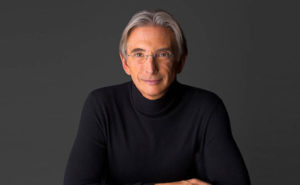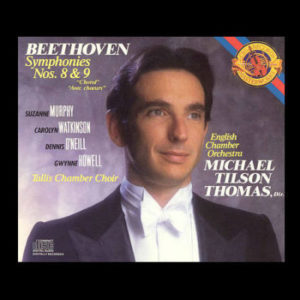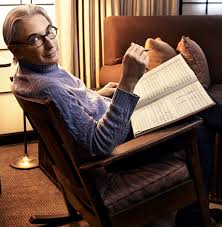Last week I called the San Francisco Symphony box office to switch dates for a subscription ticket with a conflict: Sunday’s performance of Beethoven’s Symphony No. 9, conducted by Michael Tilson Thomas. There was Saturday night availability, but as life has been busy of late, I weighed the pros and cons of deferring to a later program. Yes, I wanted to see MTT, the much-loved Music Director Laureate, but Beethoven’s Symphony No. 9 wasn’t particularly a must-attend. “I see that MTT will be conducting again in the spring,” I told the woman on the phone. “Tchaikovsky’s Fourth Symphony — I love that one. Maybe I’ll pick that concert since things are so busy now.” But then I paused and asked, “How is he?”
She hesitated.
Her hesitation gave me my answer.
“I’ll take this Saturday’s performance,” I said. “I would never forgive myself if I delayed seeing MTT at the podium and between now and then, he stopped conducting.”
“I think that’s a good idea,” she admitted.
You see, in March 2022, Michael Tilson Thomas delivered an announcement: he’d been diagnosed (in 2021) with brain cancer, a glioblastoma. Also known as glioblastoma multiforme (GBM), it’s the most aggressive type of brain cancer and has tragically poor prognosis for survival. According to the Brain Tumor Charity, the average glioblastoma survival time is 12-18 months. Only 25 percent of patients survive more than one year, and only 5 percent of patients survive more than five years. My father-in-law, diagnosed with a glioblastoma in November 2009, was told he had three to six months. He died ten weeks later.
MTT, diagnosed in the fall of 2021 (don’t do the math; it’s scary), has still been conducting, domestically and on the international stage, to broad acclaim. But even extraordinary, visionary, fierce, charismatic, beloved MTT can’t outsmart or outrun a glioblastoma.
So I went on Saturday.
I adore MTT not just because he’s a rock star in the classical music, a delightful and compelling orator, but because he has essentially been the host of my personal classical-music journey of the past two decades. There I was, back in 2004, deciding I wanted to write a novel that included a violinist, a concert soloist, as the protagonist. I knew nothing about the violin, having never even examined a violin up close, much less tried to play one. But the muse whispered, go learn; go buy a season subscription to the San Francisco Symphony and let it teach you things you don’t know. Of course I’d always known and loved classical music, but I’d largely stuck to the same three dozen favorites over the years. It’s a different experience, having a season subscription, versus cherry-picking your favorite composition or composer for a single ticket. When someone’s curating the programs for you, matching up doses of music that educate you even as they entertain and nourish you, well, you grow.
Twenty years, you figure, is the equivalent of being a student from elementary school through graduate school. MTT and my subscription series have been my guide through it all [up to 2020 and COVID]. Sure, there’ve been plenty of guest conductors, but what you always knew was that MTT had made intelligent, thoughtful programming choices. Most times, I loved the mix. Sometimes there were new commissions I disliked even as I appreciated the way they were teaching my ears something new. One memorable concert featured a 70-minute new commission by John Adams that felt aimless and jarring and I thought, okay, not for me, and when the hell is this going to end? But one time in twenty years of subscription concerts—that’s pretty impressive. Which describes Michael Tilson Thomas’s tenure as music director from 1995 to 2021: damned impressive.
When he came onstage Saturday night at Davies Symphony Hall, well, I cried. We all rose from our seats — the house was completely sold out — and clapped and clapped. I kept furtively wiping my eyes until I figured there was no point in trying to stop the flow.
You could see how the cancer battle had weakened him. An aide followed behind him to the podium, likely in case he should stumble. A stool had been placed behind him, in case he needed to sit at any point. While conducting, his gestures and directives to the musicians were small, truncated, nothing like his exuberant conducting of past years. But you could still see him come alive through his conducting. The orchestra gave and he took, and vice versa. It was like the interactive momentum of the ocean, vast, impressive and soul-stirring.
There’s a significant factor to MTT’s conducting Beethoven’s Ninth. In September 1995, it was his first program and concert as music director of the San Francisco Symphony, heralding the arrival of an extraordinary talent that would go on to help reshape the San Francisco Symphony into the world-class institution it is now. And there’s Beethoven himself to consider. In addition to being a musical genius, he was a ground-breaker, a classical-music rebel, frequently rejecting standard classical practices in order to write music filled with emotion. And this symphony, Beethoven’s last, was the pinnacle. René Spencer Saller, in the program notes, shares:
“For Beethoven, who mulled over parts of this music for decades, the meaning of the Ninth Symphony was urgent, immediate, vital. He wanted his music to enact a journey of transformation, exploring themes of struggle and salvation, community and compassion.”
I’m not going to attempt a review of the performance — that’s not where my head is at right now. If you’re interested, Joshua Kosman wrote a great one HERE on Thursday night’s [identical] program.But suffice to say that Saturday night’s performance was massive and unforgettable and, wow, yes, I needed to be there. I dare say that anyone who attended it will never forget its power, its luminosity.
The applause, the ovation, once the performance was over, went on and on. None of us wanted the magic to end. We yearned for as much of MTT as we could get. San Francisco Mayor London Breed joined him onstage for the third bow, and spoke wonderfully of him, his impact on the San Francisco arts and culture scene for over 25 years. She delivered the announcement we’d all dreaded but half-expected: that this would be his final set of performances in conducting the San Francisco Symphony. She followed this with more uplifting news, announcing that the portion of Grove Street directly in front of Davies Symphony Hall (between Van Ness Avenue and Franklin Street), would be renamed “MTT Way.” What a delight to hear. What a curious comfort.
How wonderful that he was alive to hear this. How wonderful that he is alive, period. And still with his signature wit, as he demonstrated when he took the mic and thanked Mayor Breed in that smooth voice we all love, and quipped, “Does this mean I won’t have to pay my parking tickets anymore?” which had all of us howling with laughter and loving him all the more.
Most classical music fans are aware that Beethoven, in his final years, was completely deaf. He insisted nonetheless on conducting at the Ninth Symphony’s 1824 premiere. He remained so caught up in the music in his head, that he didn’t realize the musicians had stopped. Joshua Kosman concludes his review with the following:
“According to some versions of the story, [Beethoven] was unaware of the tumultuous applause that had greeted his unorthodox masterpiece until the mezzo-soprano soloist, tears streaming down her cheeks, turned the old man to face the audience. It was hard not to think of that incident as [Thursday night’s mezzo-soprano soloist] Tamara Mumford took Thomas by the arm and helped him down from the podium to face his audience. Like Beethoven, Thomas knew exactly what he had accomplished, and he knew — and knows — how deeply every Bay Area concertgoer loves and appreciates him.”
We love you, Michael Tilson Thomas. Now, and forever.



Oh man. I’m bawling! What a wonderful review of an amazing man! How I wish I had been able to attend with you.
Blessings and peace and comfort to you Mr. Thomas.
Big, big hugs to you for your comment, Donna. It was an emotional experience just to write this essay, even though Saturday night was much more emotional. I guess when one is thoughtfully penning a piece on someone who might very soon die, the high emotions are inevitable. That said, much easier to write such an essay, knowing MTT is still alive and kicking.
Thank you sooooooo much for appreciating this piece.